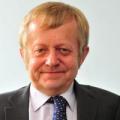TODAY a group of North German visitors will visit Blackburn Old Cemetery to see the grave of Max Samuel, the town's equivalent of Oskar Schindler.
The Jewish businessman had founded the EMSA shoe factory in Mecklenburg in 1906 and in 1926 moved with his business to Rostock.
As Hitler the Nazi Party moved into power in the 1930s, he began to support his community in the face of growing persecution.
In 1934, Max''s lawyer son Herbert moved to Blackburn and set up a branch of EMSA in Paterson Street.
In 1937 his sister Kathe and her husband Herman Kaiser followed him to the town and Max's wife Berta died.
In the same way as the hero of the 1993 feature film Schindler's list saved an estimated 1,200 Jews from the holocaust, Max gave his fellows protection and work paying for many to flee the Nazis.
Blackburn and Lancashire welcomed many of these refugees and its EMSA factory employed several including Gerhard Rosenstein and Otto Wolffs, as Hilary Thomas records on her book on the town's Jewish history 'From Poland to Paradise Lane'.
Today's visit has been arranged from the Max Samuel Jewish Museum in his former Rostock house.
Maurice Ffelan from the Friends of Blackburn Old Cemetery said: "They are coming to see the graves of Max Samuel and members of his family who are buried in the Jewish section of the Whalley New Road cemetery.
"He was noted for his philanthropic work and especially for the financial help he gave to Jews fleeing Germany.
"In this respect he was like Oskar Schindler (albeit on a smaller scale but at far greater personal risk as he was a Jew without any influential Nazi friends!).
"He narrowly escaped detection by the Nazi authorities, leaving Germany only months before the war broke out."
In 1937 Max and his wife Berta saw their business and villa home seized by the Nazis/
At 5.30pm Dr Ulf Heinsohn from the museum in Rostock will give a free talk about Max Samuel at the Peridot Base Neighbourhood Centre on Peridot Close.
Max died in Blackburn in 1942 and was buried in the small Jewish section in the top right hard corner of the cemetery.
Kathe and Herman Kaiser emigrated to the USA founding a successful oil business.
In 1991 his Rostock villa was returned to the family who gave it to town which turned it into the Max Samuel Haus museum, library and cultural centre






Comments: Our rules
We want our comments to be a lively and valuable part of our community - a place where readers can debate and engage with the most important local issues. The ability to comment on our stories is a privilege, not a right, however, and that privilege may be withdrawn if it is abused or misused.
Please report any comments that break our rules.
Read the rules hereLast Updated:
Report this comment Cancel